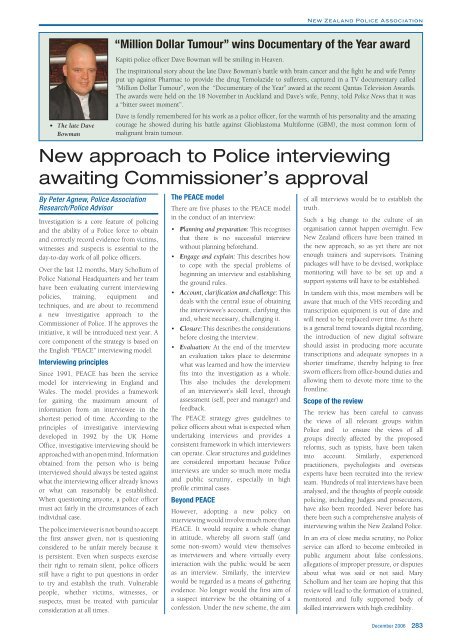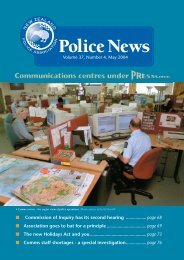Bald On The Beat - New Zealand Police Association
Bald On The Beat - New Zealand Police Association
Bald On The Beat - New Zealand Police Association
You also want an ePaper? Increase the reach of your titles
YUMPU automatically turns print PDFs into web optimized ePapers that Google loves.
<strong>New</strong> <strong>Zealand</strong> <strong>Police</strong> <strong>Association</strong>• <strong>The</strong> late DaveBowman“Million Dollar Tumour” wins Documentary of the Year awardKapiti police officer Dave Bowman will be smiling in Heaven.<strong>The</strong> inspirational story about the late Dave Bowman’s battle with brain cancer and the fight he and wife Pennyput up against Pharmac to provide the drug Temolazide to sufferers, captured in a TV documentary called“Million Dollar Tumour”, won the “Documentary of the Year” award at the recent Qantas Television Awards.<strong>The</strong> awards were held on the 18 November in Auckland and Dave’s wife, Penny, told <strong>Police</strong> <strong>New</strong>s that it wasa “bitter sweet moment”.Dave is fondly remembered for his work as a police officer, for the warmth of his personality and the amazingcourage he showed during his battle against Glioblastoma Multiforme (GBM), the most common form ofmalignant brain tumour.<strong>New</strong> approach to <strong>Police</strong> interviewingawaiting Commissioner’s approvalBy Peter Agnew, <strong>Police</strong> <strong>Association</strong>Research/<strong>Police</strong> AdvisorInvestigation is a core feature of policingand the ability of a <strong>Police</strong> force to obtainand correctly record evidence from victims,witnesses and suspects is essential to theday-to-day work of all police officers.Over the last 12 months, Mary Schollum of<strong>Police</strong> National Headquarters and her teamhave been evaluating current interviewingpolicies, training, equipment andtechniques, and are about to recommenda new investigative approach to theCommissioner of <strong>Police</strong>. If he approves theinitiative, it will be introduced next year. Acore component of the strategy is based onthe English “PEACE” interviewing model.Interviewing principlesSince 1991, PEACE has been the servicemodel for interviewing in England andWales. <strong>The</strong> model provides a frameworkfor gaining the maximum amount ofinformation from an interviewee in theshortest period of time. According to theprinciples of investigative interviewingdeveloped in 1992 by the UK HomeOffice, investigative interviewing should beapproached with an open mind. Informationobtained from the person who is beinginterviewed should always be tested againstwhat the interviewing officer already knowsor what can reasonably be established.When questioning anyone, a police officermust act fairly in the circumstances of eachindividual case.<strong>The</strong> police interviewer is not bound to acceptthe first answer given, nor is questioningconsidered to be unfair merely because itis persistent. Even when suspects exercisetheir right to remain silent, police officersstill have a right to put questions in orderto try and establish the truth. Vulnerablepeople, whether victims, witnesses, orsuspects, must be treated with particularconsideration at all times.<strong>The</strong> PEACE model<strong>The</strong>re are five phases to the PEACE modelin the conduct of an interview:• Planning and preparation: This recognisesthat there is no successful interviewwithout planning beforehand.• Engage and explain: This describes howto cope with the special problems ofbeginning an interview and establishingthe ground rules.• Account, clarification and challenge: Thisdeals with the central issue of obtainingthe interviewee’s account, clarifying thisand, where necessary, challenging it.• Closure: This describes the considerationsbefore closing the interview.• Evaluation: At the end of the interviewan evaluation takes place to determinewhat was learned and how the interviewfits into the investigation as a whole.This also includes the developmentof an interviewer’s skill level, throughassessment (self, peer and manager) andfeedback.<strong>The</strong> PEACE strategy gives guidelines topolice officers about what is expected whenundertaking interviews and provides aconsistent framework in which interviewerscan operate. Clear structures and guidelinesare considered important because <strong>Police</strong>interviews are under so much more mediaand public scrutiny, especially in highprofile criminal cases.Beyond PEACEHowever, adopting a new policy oninterviewing would involve much more thanPEACE. It would require a whole changein attitude, whereby all sworn staff (andsome non-sworn) would view themselvesas interviewers and where virtually everyinteraction with the public would be seenas an interview. Similarly, the interviewwould be regarded as a means of gatheringevidence. No longer would the first aim ofa suspect interview be the obtaining of aconfession. Under the new scheme, the aimof all interviews would be to establish thetruth.Such a big change to the culture of anorganisation cannot happen overnight. Few<strong>New</strong> <strong>Zealand</strong> officers have been trained inthe new approach, so as yet there are notenough trainers and supervisors. Trainingpackages will have to be devised, workplacemonitoring will have to be set up and asupport systems will have to be established.In tandem with this, most members will beaware that much of the VHS recording andtranscription equipment is out of date andwill need to be replaced over time. As thereis a general trend towards digital recording,the introduction of new digital softwareshould assist in producing more accuratetranscriptions and adequate synopses in ashorter timeframe, thereby helping to freesworn officers from office-bound duties andallowing them to devote more time to thefrontline.Scope of the review<strong>The</strong> review has been careful to canvassthe views of all relevant groups within<strong>Police</strong> and to ensure the views of allgroups directly affected by the proposedreforms, such as typists, have been takeninto account. Similarly, experiencedpractitioners, psychologists and overseasexperts have been recruited into the reviewteam. Hundreds of real interviews have beenanalysed, and the thoughts of people outsidepolicing, including Judges and prosecutors,have also been recorded. Never before hasthere been such a comprehensive analysis ofinterviewing within the <strong>New</strong> <strong>Zealand</strong> <strong>Police</strong>.In an era of close media scrutiny, no <strong>Police</strong>service can afford to become embroiled inpublic argument about false confessions,allegations of improper pressure, or disputesabout what was said or not said. MarySchollum and her team are hoping that thisreview will lead to the formation of a trained,monitored and fully supported body ofskilled interviewers with high credibility.December 2006283

















